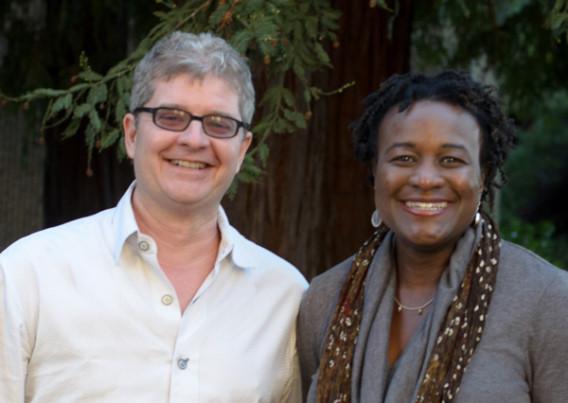
Broader research agenda needed to address inequality, scholars say
When studying social inequality, scholars have not done enough to examine the many influences that shape life chances and well-being in the United States.
This is one conclusion in a new report on the state of academic research on inequality. The report, called “Inequality Matters,” was written by Professors Prudence Carter and Sean Reardon at the Stanford Graduate School of Education, and done in collaboration with the William T. Grant Foundation and the Ford Foundation.
In their own words: Read Carter's and Reardon's blog post on the research
Carter and Reardon review more than 40 years of research on inequality, including inequality in income, health, education and political power. They conclude that, despite extensive scholarship on the trends and patterns of social inequality, there are gaps in the research that have led to an incomplete understanding of the consequences of inequality and the ways to reduce it.
“The scholarly record on inequality is mixed at best, and it depends on what kind of inequality you are examining” said Carter, the faculty director of the John W. Gardner Center for Youth and Their Communities at the GSE. “There is simply not enough high-quality research or relevant data to form evidence-based conclusions about how to minimize the effects of inequality. It’s partly up to the academic community to address these shortcomings.”
“We know, to some extent, what produces inequality, but not what its consequences are,” adds Reardon, the Professor of Poverty and Inequality in Education at the GSE.
“Carter and Reardon make a strong case for new research to address key gaps in our understanding of inequality,” said Adam Gamoran, president of the William T. Grant Foundation. “To address this need, we recently launched a new program of grant-making to support research on programs, practices and policies that reduce inequality in outcomes for young people.”
What is inequality?
To begin understanding inequality, Reardon and Carter first defined what the term means.
Although economic inequality is a key form of inequality today, the authors note that many other forms of inequality are important. These include differences in educational success, physical and mental health, and political power. The researchers also note several important forms of sociocultural inequality, such as differences in personal identity, cultural freedoms and human rights. Many of these forms of inequality are evident in differences by race, ethnicity, gender, religion, immigrant status, sexual orientation and socioeconomic status.
Reardon and Carter urge scholars to think about inequality in an ecological context, not just an individual one.
“Inequality is not random,” Carter said, “but rather it is deeply embedded in America’s social organizations, institutions, communities, neighborhoods and relationships.”
What's missing?
The paper identifies four holes in the research to date.
First, Reardon and Carter say, is our lack of understanding of the inequality of opportunity versus inequality of outcomes.
This means exploring the many influences that shape life chances and welfare in America. Researchers need, Carter and Reardon say, to separate what is attributable to the contextual environment—the ecology—and what is attributable to individual differences. Understanding the broader ecology of inequality is the key to making tangible improvements.
If one understands the extent to which racial differences in educational outcomes are due to differences in early childhood experiences, neighborhood contexts, or the availability of high-quality schools, for example, then it is possible to make strategic investments and policy changes to improve racial inequality in education.
Second, while the academic community has documented patterns, trends and causes of social inequality, it has been less successful in exploring strategies for reducing it.
“Right now, we know more about what factors are correlated with inequality, but we can’t say one thing causes another,” Carter said. “If we are to address inequality in a meaningful way, we need more research to know what are the things that are at the heart of inequality, and how we can eliminate or solve them.”
Third, scholars have not looked closely enough at how people come to view inequality as part of the natural order of things.
Carter and Reardon point to the sometimes covert roles of elites, private institutions, and corporations in shaping policies that cause and perpetuate inequality. Because not much research has investigated such processes and their effects, we know relatively little about them.
“There’s a sense that inequality is natural. That people somehow deserve where they end up,” Reardon explained. “We want to know how it is that these perceptions come about and how to address them.”
And finally, the authors say, inequality has been studied almost exclusively through the lens of poverty and other forms of disadvantage. “We tend to focus on the poor in terms of economic inequality because we are concerned with their well-being, and because they are relatively easier to reach, but that leaves gaps in our understanding at the other end of the inequality spectrum,” Carter said.
“We need to study how the actions of advantaged groups perpetuate inequality. We must ask, ‘Are there things the affluent are doing that we could provide to other groups?’” Carter said. “And we need to know how the actions of the advantaged—particularly their political and economic actions—affect the less advantaged. If we treat the poor as if they are the sole authors of their own condition, we will never fully understand or reduce inequality.”
The researchers say more study is needed to inform how America can address inequality in new and fairer ways.
“In an era when certain types of inequality are increasing,” Reardon noted, “there is a real need to understand the broader processes and consequences of inequality to create policies that could have a real and positive effect on the lives of children across the country.”
More information:
"Inequality Matters," by Prudence Carter and Sean Reardon.
Carter's and Reardon's blog post.
___
Andrew Myers is a freelance writer who frequently covers scientific and academic research.



